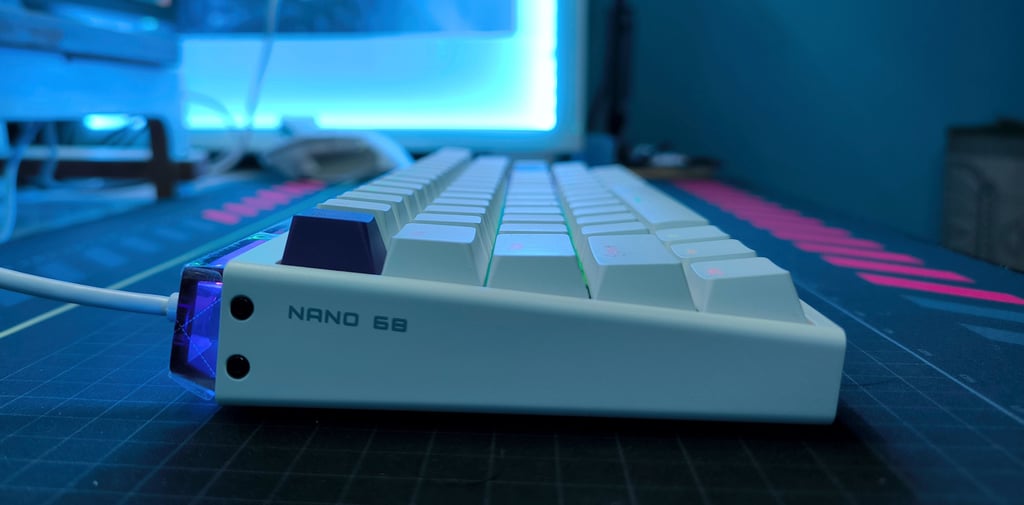Hall Effect vs Mechanical Keyboards: What's the Hype?
Ever wondered what makes Hall Effect keyboards different from your everyday mechanical board? In this article, we break it down for you in plain language—with a little nerdy deep dive if you're into that sort of thing.
INFORMATIVE
Shahroz Naeem
4/24/20253 min read
Introduction
Whether you're just getting into mechanical keyboards or you've been in the hobby for a while, chances are you've heard the buzz around Hall Effect keyboards. So what’s the big deal? How do they stack up against standard mechanical keyboards—and should you even care?
Let’s break it down in a way that makes sense without needing an electrical engineering degree (but we’ll get a little nerdy later if you're into that).


The Basics: What You’re Probably Using Now (Mechanical Keyboards)
Most people in the mechanical keyboard world are using standard mechanical switches like those made by Cherry, Gateron, or Kailh. These brands offer a huge range of switch types that work using physical metal contacts. When you press a key, the contacts touch, complete a circuit, and send a signal to your computer.
A Cherry MX Blue switch – a classic mechanical design using metal contacts
Why People Love Mechanical Switches:
Tons of switch options (linear, tactile, clicky, silent, etc.)
Easy to customize and mod
Satisfying to type on (let’s be honest, that thock is addicting)
But they’re not perfect. Over time, the metal contacts can wear out or become scratchy. Debris and oxidation can also cause issues. And you’re limited by the actuation point that the manufacturer set—there’s no fine control.
Enter: Hall Effect Switches
Hall Effect switches don’t use physical contacts at all. Instead, they use magnets and sensors.
How a Hall Effect sensor works – magnetic field strength affects output voltage.
Here’s the TL;DR:
There's a magnet in the switch stem.
A Hall Effect sensor under the key measures changes in the magnetic field when the key moves.
This tells the keyboard exactly how far the key has been pressed—without any parts actually touching.
No contact = no wear and tear = way more durability.
Why Hall Effect Keyboards Are Getting Popular
☑️ Smooth & Durable
Because nothing physically touches to send a signal, Hall Effect switches can last tens of millions more keystrokes than mechanical ones. They're great for longevity.
🔄 Adjustable Actuation
With some Hall Effect keyboards, you can customize how far you need to press a key before it registers—anywhere from 0.1mm to 4.0mm.
No more being stuck with a fixed actuation point.
⚡ Rapid Trigger
This feature resets the key as soon as you start to release it, which is perfect for fast-paced gaming. You can spam actions without needing to fully release the key like on traditional mechanical boards.
🎮 Analog Control
One of the coolest features? Analog input—you can program different actions depending on how far you press the key.
Light press = walk
Full press = run
🧩 Dynamic Keystroke (DKS)
This advanced feature lets you assign multiple functions to a single key depending on how far you press it.
Half-press = crouch
Full-press = prone
It opens up some creative and efficient macros, especially for gamers and productivity nerds.
🧠 For the Nerds: Let’s Get Technical
Hall Effect sensors work by detecting the strength of a magnetic field. Here's what makes them different under the hood:
Most Hall Effect keyboards use a linear switch design by default. So if you’re a fan of clicky or tactile switches, you might miss that bump or click—although companies are experimenting with simulated tactile feedback now too.
So, Should You Switch?
If you:
Love to customize everything
Want extreme durability
Are into analog gaming or per-key control
Want next-level features like rapid trigger and dynamic key functions
Are playing multiplayer games competitively
…then Hall Effect keyboards are 100% worth looking into.
But if you’re happy with your current setup, love a particular tactile switch, or just enjoy the sound/feel of traditional boards—you don’t have to switch.
It’s more of a cool evolution of keyboard tech than a mandatory upgrade.
Final Thoughts
Hall Effect keyboards are bridging the gap between mechanical reliability and futuristic customization. They’re still relatively new in the mainstream market, but more options are popping up—from gaming-focused boards to enthusiast builds.
Whether you’re here for the tech or just want a keyboard that lasts forever, Hall Effect keyboards are definitely something to keep on your radar.

Unlock Your Performance with Hall Effect
Discover our innovative collection of magnetic keyboards and elevate your gaming experience today!

Nerdy Nest
Bespoke Keyboards - Tailored to your preferences
Quick Contact
© 2025. All rights reserved.
Information
